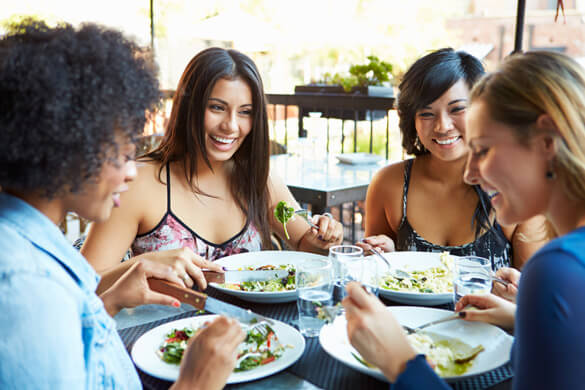
Why We Eat and Our Emotions
Have you ever asked yourself, “Why do we eat?” According to food psychologist, Dr. Brian Wansink, we make over 200 food decisions per day and we are only
aware of 90% of those decisions (The Science of People).
Although, one of the most important reasons we eat is because it is a basic necessity for human survival. Outside of air and water, food is
the only other thing required for human life. Food provides us with important nutrients including vitamins, minerals, fat, carbohydrates, fiber and
protein. These nutrients are then utilized by the body to build tissues and organs. So, one reason we may eat is to fuel the tank. If the tank isn’t
filled, we can’t go. However, most of the time we are eating for reasons other than to fuel the tank.
aware of 90% of those decisions (The Science of People).
Although, one of the most important reasons we eat is because it is a basic necessity for human survival. Outside of air and water, food is
the only other thing required for human life. Food provides us with important nutrients including vitamins, minerals, fat, carbohydrates, fiber and
protein. These nutrients are then utilized by the body to build tissues and organs. So, one reason we may eat is to fuel the tank. If the tank isn’t
filled, we can’t go. However, most of the time we are eating for reasons other than to fuel the tank.
Other reasons we may eat could be dictated by our social context (read more).
We are likely to adopt eating patterns similar to those we spend the most time with. This explains why college students have similar eating
patterns or if someone is a grazer their significant other may be as well. Yet in a similar sense behavior change will be most successful when
supported by your social circle. (Mayo Clinic Research and Clinical Work )
Sometimes people eat because they are sad, mad, happy, or bored. Eating and food have a strong link to our emotions. Eating can be used to provide support,
comfort or reward — caused by emotional hunger. Emotional hunger occurs when we use food to make ourselves feel better. For example, a crying baby
is often comforted by its mom and warm milk. The idea that food will alleviate problems is impressed upon us from the day we are born. While sometimes
this is okay when we rely on food as a coping mechanism the cause of the emotions is not necessarily addressed and it can become reoccurring. Have
you ever wondered if you are an emotional eater?
comfort or reward — caused by emotional hunger. Emotional hunger occurs when we use food to make ourselves feel better. For example, a crying baby
is often comforted by its mom and warm milk. The idea that food will alleviate problems is impressed upon us from the day we are born. While sometimes
this is okay when we rely on food as a coping mechanism the cause of the emotions is not necessarily addressed and it can become reoccurring. Have
you ever wondered if you are an emotional eater?
Here are some good questions to ask yourself:
1.Do you eat when you’re feeling stressed?
2.Do you eat when you’re not hungry or when you’re full?
3.Do you eat to feel better (to calm and soothes yourself when you’re sad, mad, bored, anxious, etc.)?
4.Do you reward yourself with food?
5.Do you regularly eat until you’ve stuffed yourself?
6.Does food make you feel safe? Do you feel like food is a friend?
7.Do you feel powerless or out of control?
It is very common and normal if you answered yes to one or some of these questions. However, you may want to consider if you are emotional eater and try
to identify the trigger. Some commons triggers include stress, boredom or feelings of emptiness, childhood habits, or even social influences. Once
you are able to identify the trigger then either on your own or with the help of a professional (a registered dietitian or therapist) then you can
learn and practice other coping mechanisms that do not rely on food to manage your emotions. Learn more at Emotional Eating vs. Mindful Eating.
to identify the trigger. Some commons triggers include stress, boredom or feelings of emptiness, childhood habits, or even social influences. Once
you are able to identify the trigger then either on your own or with the help of a professional (a registered dietitian or therapist) then you can
learn and practice other coping mechanisms that do not rely on food to manage your emotions. Learn more at Emotional Eating vs. Mindful Eating.
Stay tuned for part two- “Fueling Our Feelings”.



